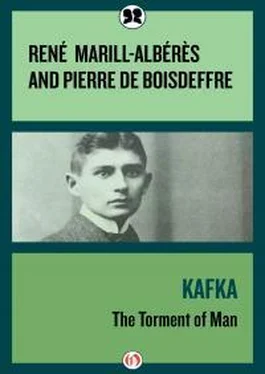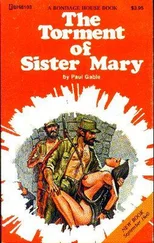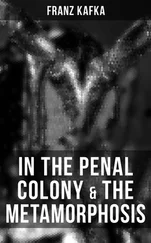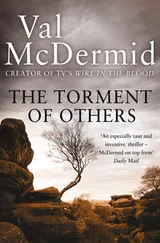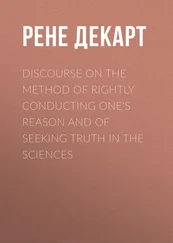5. “The Window,” in Meditation (Betrachtung) .
6. Diary , December 25, 1910. The same thoughts are expressed in the early writings of Proust.
7. Diary , December 16, 1910.
8. Diary , January 19, 1911.
9. Diary , May 9, 1912.
10. Gustav Janouch, Gespräche mit Kafka (Frankfort: Fischer, 1951). Quoted from French translation Kafka m’a dit (Paris: Calmann-Levy, 1952), p. 29.
11. Max Brod, Franz Kafka, eine Biographie (Frankfort: Fischer, 1951). Translated by G. Humphreys Roberts and Richard Winston (New York: Schocken Books, Inc., 1947, 1960).
12. Ibid . (English edition), p. 166. Italics added.
13. “The Judgment.” Quoted from the French translation by A. Viallate, in La métamorphose (Paris: Gallimard, 1955), p. 130.
14. Janouch, op. cit ., p. 27.
III
KAFKA AND THE PROSPECT OF MARRIAGE
(1912-1921)
Without forebears, without marriage, without descendants, with a violent desire for forebears, marriage, descendants . 1
… Even under the most favorable circumstances, it is probable that in a happy union I would despair . 2
What I have to do, I can do only alone. Become clear about the ultimate things . 3
In 1912 Kafka not only began enthusiastically to compose his first great works but also met F. B. and came to grips with the problem of marriage. To say that he took the problem seriously is an understatement: he recognized it immediately as the dramatic choice of his life. The problem had two aspects: first the problem of marriage itself, which was already enough to frighten him; then the nature of his relations with F. B. and the prospect of a common life with her. These two problems were naturally indissolubly interlinked, yet the solution of one would not contribute to the solution of the other. In other words, Kafka might decide that he was capable of living with his fiancée and still not believe himself fitted for marriage—and vice versa. Here comparison with Amiel, and to an even greater degree with Kierkegaard, is inescapable. Forever reluctant, these men were unnerved by the very prospect of marriage which pointed up “the impossibility of living.”
With Kafka as with Kierkegaard, 4the father’s example inspired the vision of marriage: patriarchal authority suffused the image of the hearth (Max Brod sees in a story such as “Eleven Sons” the symbol of Kafka’s desire for fatherhood, for “founding a family, which can be held up against the father’s example as something of equal value”). 5First let us follow Kierkegaard’s itinerary, which Kafka seems to have taken as his model. Kierkegaard, who then planned to devote his life to the ministry, became engaged (September 10, 1840) to Regine Olsen the day after his father died. All too soon, however, his joy gave way to dreadful hesitations, with the result that he was unable to accept the notion of marriage. His Diary yields only an imperfect explanation of his mental state and casts even less light on the true reasons for his definite break with her, in October of 1841. “The only thing that consoles me,” wrote Kierkegaard in the fall, “is that I could be about to die and still, at the hour of my death, confess this love which I shall never dare to confess as long as I am alive and which by the same token constitutes my happiness and my grief.”
Like Kafka, Kierkegaard was crushed by the weight of his own destiny. How could he have dared to have another person share it? How could he think of marrying when he sensed his almost disembodied nature? A “born spirit,” as his translator Knud Ferlov realized, he saw persons only against a background of clear ideas. He knew that there was something incorporeal about himself, “something that makes it impossible for anyone to see me every day and have a real relationship with me. To be sure, in the light overcoat in which I exhibit myself daily the situation is different, but in my home anyone would see that I live essentially in a world of spirits. I have been engaged to her for a year, and she has not really known me.”
This exaggerated shyness was so transparent that the young lady’s father had gone so far as to promise his future son-in-law never to set foot in their home if Kierkegaard would consent to marry Regine! To free his fiancée Kierkegaard thought that he had to disguise himself as a seducer, and he took this role so seriously that he was probably the only one actually to be deceived by the production. Nevertheless, the responsibility for the break weighed heavily on him. When he learned of Regine’s engagement to her first suitor, Fritz Schlegel, he did not forgive her any more than he forgave himself for it.
Alone with himself thereafter, Kierkegaard no longer had any occupation other than his work, any support other than the presence of God. In leaving Regine, he had “chosen death.” Cut off forever from happiness, he devoted himself to his work, to preaching “the ultimate things” to his blind comtemporaries.
We find similar incidents, but a much more complicated development, in Kafka’s amorous experience. He speaks approvingly of marriage: “To get married, to found a family, to accept all the children that are born, to maintain them in this uncertain world, and even, if possible, to give them some guidance,” he wrote to his father, “is in my opinion the utmost that a man can achieve.”
But Kafka, subtle hair-splitter and self-destroyer, immediately adds: “That so many people apparently succeed so easily is no proof to the contrary, for in the first place only a few actually succeed, and in the second place these few do not ‘accomplish’ this task but only ‘submit’ to it.” He is acutely aware that he is “as ill-suited as possible” for marriage; his experience with life is “practically null”; as for the “practical advice” (“Give it up”) offered him by his father during his adolescence, he was scandalized by it and refused to take it seriously. His real motivation for marrying was something else: as we have already noted, the state of bachelorhood terrified him . Reduced to his own existence, “having neither past nor future,” the bachelor has only the moment, the space which he occupies in life becomes smaller and smaller, and when he dies, the shroud is exactly what he deserves. “Bachelorhood and suicide occupy the same degree on the scale of knowledge.” Marriage, on the other hand, would make Kafka equal to his Father: “I could be a free son, grateful, not guilty, upright, and you, a father who would no longer oppress me, no longer tyrannize me, but would be compassionate and pleased.” But the son would have to possess the qualities of the Father, and he was already unable to bear living alone. Would marriage give more strength, more “resistance” to his existence? That was the heart of the problem.
Once more Max Brod played the role, involuntarily this time, of the Deus ex machina , presenting Kafka to a friend in Berlin, the young lady referred to in the Diary as F. or F. B. Kafka described the meeting, on August 13, 1912, in the seemingly indifferent tone which he often affected in speaking of himself.
When I arrived at Brod’s house on August 13, she was seated at the table, and I nevertheless mistook her for a maid. Although I was not at all curious to find out who she was, I accepted her right away. Bony, insignificant face that wore its insignificance openly, slender neck, blouse flung over her shoulders, she seemed to be dressed in every detail as a housekeeper even though this was by no means true as I was able to verify later, nose almost broken, blond, rather straight, unattractive hair, strong chin … As I sat down I looked at her for the first time: once seated, I already had a firm opinion of her.
Читать дальше
